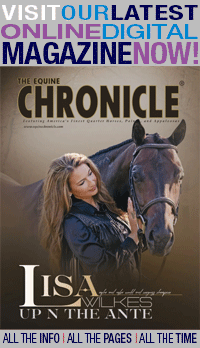An Equestrian Student’s Advice: “Don’t Be So Quick to Judge”

Maria Hogya is an equestrian studies major with a focus in dressage. Image courtesy of The University of Findlay.
We are taking the month of February 2016 to recognize four University of Findlay students who are dealing with a physical condition or disability. As one student said, “This is something I have. It does not define me. Never has. Never will.” As we present an article each week, you’ll come to learn what these students have in common. . . confidence, optimism, empathy and big plans for the future.
By: Barb Lockard
Maria Hogya has learned a few things through living with a genetic disorder that has affected her skull and facial features. She’s discovered that a little sarcasm and a good sense of humor are valuable coping tools, and she’s learned that people shouldn’t be so quick to judge others based on their appearance.
“I can be pretty sarcastic and sassy,” Hogya laughed. “My dad is the same way and it’s helped me laugh at myself sometimes.”
Born in North Carolina with Treacher Collins syndrome (also called mandibulofacial dysostosis), Hogya has been through seven surgeries, the most recent when she was a junior in high school; that one lasted 13 hours and involved extensive jaw reconstruction.
Affecting approximately one in 50,000 people, Treacher Collins syndrome (TCS) is a genetic disorder that affects the development of the skull and face. Symptoms can range from being almost unnoticeable to severe and usually result in downward slanting eyes, a small lower jaw and absent or underdeveloped cheekbones and ears. Other complications can include hearing loss and breathing problems in infants. Hogya has had them all.
“I heard that when I was born, my parents sort of freaked out,” she added. “I was taken to Duke University where the doctors were able to diagnose my condition. I think that may have been the only time my parents have been emotional about this.”
Finding Her Passion
Ironically, Hogya’s condition was probably responsible for her choice of a college major and career. Visiting an equine therapy program at the age of three, she loved the horses and refused to participate in other activities except for riding.
On her 13th birthday, her parents surprised her with “Paco,” a Paso Fino, a breed of horse from Latin America that has gained popularity in the U.S. Paso Finos are often seen in parades, on drill teams and in shows specific to their breed. The performance aspect may have led Hogya to her current focus in dressage. A sophomore in the English equestrian program, she has been assigned a University-owned horse to ride and care for, as well as a “green” horse sent to UF by owners needing help with training. The only downside this semester is her early-morning feeding duty, which requires her to be at the barn before many students are even awake.
“I initially found The University of Findlay online and was also looking at two other schools,” Hogya recalled. “When I visited UF, I knew that this was the place and program for me.” The location also worked well. It’s just a two-hour drive from her Alliance, Ohio home.
Unstoppable
Because TCS affects only her face and skull, Hogya isn’t limited in her riding activities. She does have a bone anchor hearing aid in her right occipital bone. Without it, she couldn’t hear her instructor, or announcers during horse shows. Her riding helmet accommodates her hearing aid easily.
“Cochlear implants wouldn’t work for me,” Hogya said, referring to the small electronic devices that are implanted under the skin with a small portion worn behind the ear. She removed her hearing aid matter-of-factly, to show how it fit into the back of her skull.
“This just shows you my dad’s sense of humor,” she laughed. “He’ll come up to me and ‘mouth’ words, but not really say anything. I tell him, ‘I can hear, dad!’ He still thinks it’s funny.”
The fact that strangers often stare at her isn’t particularly bothersome. She’s learned to pretty much ignore it, stating that her friends are much more upset when this happens than she is.
“Having TCS is simply something I have. It doesn’t define me. Never has, never will,” she emphasized. “It’s so sad that some people can’t see beyond what we look like. There are so many other important things about who we are.”
Although only a sophomore, Hogya is thinking about a career where she can put her degree to work.
“For the longest time, I’ve wanted to be a trainer,” she mused. “Now, I think I’d like to work with horses that have been neglected or abused.”
Maria Hogya is a skilled horsewoman, confident, outgoing and articulate. You’ll notice it the first time you meet her. . . if you take the time to look for the “important” things.











